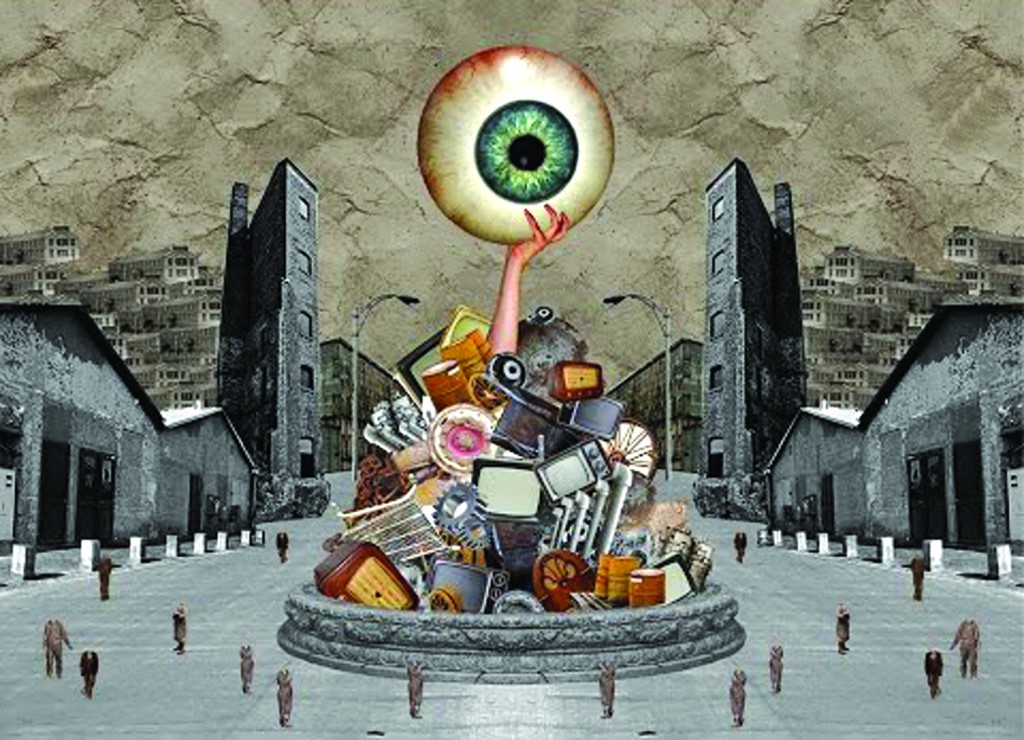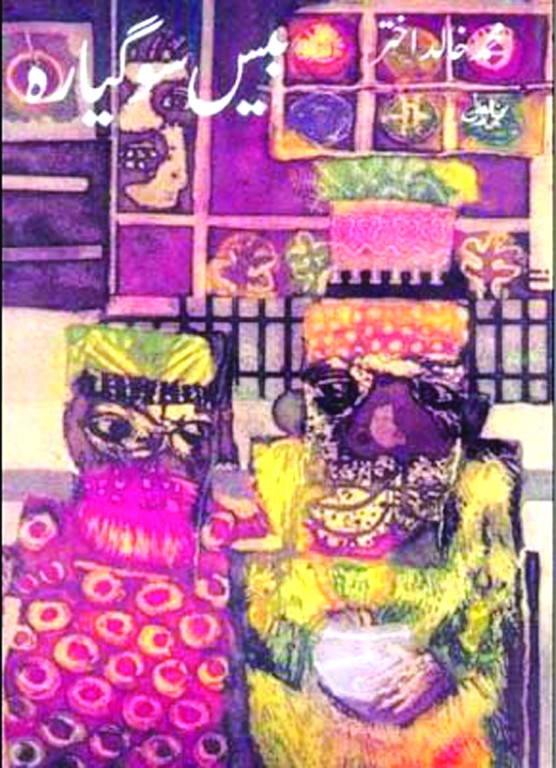
When famed Pakistani writer Mohammad Khalid Akhtar (whose birth centenary is being celebrated in 2020), wrote his much-neglected novel Bees Sau Gayara (2011), regarded as Urdu’s first social and political satire back in 1950, seventy years ago this September, the model of George Orwell’s Airstrip One in his famous novel Nineteen Eighty Four was before him in newly established Pakistan. Yet seventy years on, it is the risk of government overreach, creeping totalitarianism, the policies of newspapers, the system of educational textbooks, the tactics and willfulness of ministers and repressive regimentation of persons and sexual behaviours in Naya Pakistani society which has now given Akhtar’s dystopian satire a power, prescience and timeliness which Orwell’s classic probably could not have. This essay, will also reflect on how Urdu literature’s answer to Nineteen Eighty Four by Urdu’s Orwell deserves a place among Urdu’s canonical works, and the term ‘Orwellian’ should now indeed be replaced with ‘Akhtarian’ in Naya Pakistan!
It has had a largely neglected and marginalized run as a work of political prophecy, unlike its British counterpart, even in its author’s birth centenary year. This, despite the fact that there are no other contenders in public awareness from its era, at least in South Asia. 2011 is obviously a Cold War book, but the Cold War ended 30 years ago. What accounts for its astonishing neglect and staying power simultaneously, 70 years on?
Akhtar went against the grain in conceiving of Pakistan as a totalitarian state seventy years ago in the same manner and at the same time his contemporary Orwell envisaged the shape Britain could take in the future. Yet 2011 is obviously a fantasy. A fantasy meaning some such imaginative writing in which the writer by the force of his observation and the high flight of imagination, sometimes pulls the future into the present and presents circumstances and events in the manner of prediction before us. Sometimes he calls out to a bygone era to juxtapose it shoulder-to-shoulder with the present; and sometimes he entertains and influences the reader with the imaginative connections and contradictions of the past, future and present by joining the past and future into the present; and makes various social inequalities a target of satire with the help of imagination.

In Urdu literature, one does not find any systematic writing of this nature before 2011, although we do see this type of style in the writings of a few writers. First of all, we find samples of this with Muhammad Husain Azad, especially his essay Shohrat-e-Aam Au Baqaa-e-Davaam Ka Darbar (The Court of Popularity and Immortality) is a beautiful example in this connection. Then one also finds an excellent use of this very imaginative style in Mirza Farhatullah Beg’s Dilli Ka Aik Yadgaar Mushaira (A Memorable Mushaira of Delhi).
After this book of Mohammad Khalid Akhtar, one also finds a bit of a cautious tradition in the making in this regard. For example, Rafiq Hussain’s short-story Aaina-e-Hairat (The Mirror of Wonder) is an interesting work in this connection. A column of Ata-ul-Haq Qasmi Aah Ata-ul-Haq Qasmi (Alas Ata-ul-Haq Qasmi) is also a link in this series and then with Mohammad Khalid Akhtar indeed, his published essay in the journal Funoon titled Tazkira-e-Ahl-e-Lahore (Memory of the People of Lahore) consisting of two parts also assumes the colour and form of fantasy, in which alongwith narrating about the art and personality of a few famous writers and poets living in Lahore, the death of a few of them has also been predicted. In addition, one finds in various short-stories, dramas and films something of a colour of fantasy. Though in this genre, after 2011, there is no systematic publication apart from Naseem Hijazi’s Sau Saal Baad (After A Hundred Years) and Sufaid Jazeera (The White Island).

2011 is a very valuable novel due to its structure, arrangement of events, plot, dialogic style, suspense and illustration of social problems. Mohammad Kazim has indeed deemed it a systematic novel, which has been given the form of a fantasy in a metaphorical manner. Mohammad Khalid Akhtar himself too has referred to it as a novel at many places. For this reason, we will discuss and analyze this work in the genre of the novel.

This fantasy of Mohammad Khalid Akhtar has been written in imitation of Western writer George Orwell’s 1984. It is indeed a result of the writer’s innovative disposition and singular imagination that till now it is a unique and unparalleled creation of its type in Urdu literature. It is the first and important facet of Akhtar’s multifaceted art, in which he has unveiled the artificiality of political, economic and social life of that period in a satirical, comical and metaphorical manner; and has satirized the various sectors of life good-naturedly but fearlessly. Kanhaiya Lal Kapoor, the eminent Urdu satirist, loved this style so much that he wrote expressing his wish to be the writer of this novel. Ibne Insha deemed it as “delightful satire.”
On the other hand, Akhtar’s contemporary Mohammad Kazim, collectively analyzing Akhtar’s art said so about this fantasy:
“In our new country, the brand new democratic rule was going through stages of experimentation. The free and careless atmosphere of democracy had given birth to an agreeable attitude towards government and politics, with which sensitive temperaments could not but be influenced. An atmosphere of every sort of freedom and waywardness carries the same sort of impression for a satirist, which the morning breeze has for the flowers of the garden. He finds the instigation for his critical beauty therein and his art continues to find new forms of expression. These were the conditions in which Mohammad Khalid Akhtar wrote his novel ‘Bees Sau Gayara’, which was ostensibly a fantasy but actually a good-natured but strong satire in metaphorical style and on this basis, a totally novel thing in Urdu literature.
The formalities, display and traditions in the protocol of governments which have continued since time immemorial; and the styles of ministers and the manners of thinking and working of new democratic governments, which can be seen even today everywhere; all of them are the subject of ‘Bees Sau Gayara’. In addition, a special religious mentality, the uncompromising image of the woman and purdah among the people, the style of working of the political parties, especially the Communists, and the groupings of writers and their mutual disputes, all of these aspects of life at the time come under the target of the act of sarcasm and satire.”
In this fantasy, Akhtar while narrating the tale of the tour of the President of an imaginary 21st-century state ‘Yoknapatawha’ (clearly inspired from William Faulkner’s fictional Mississippi county) to another state ‘Maznine,’ has beautifully unveiled the paucities and perversities of society. One finds an attack on some Eastern manners and a deep satire, too, on the Western mode of life; the blind rat-race of materialism in which humanity and sincerity began to depart and which turns human life into a mere machine, crushes human feelings and emotions and strikes a huge blow upon social, moral and cultural values.

All this was definitely very painful for a sensitive man. Before this, Allama Iqbal’s poetry, too, expresses this tragedy with great intensity.
In this work, one finds the struggle of great powers, the exploitation of smaller nations, female emancipation, rebellion against religion, so-called pir-worship, Western democracy, socialism and imperialism, conflict on the basis of colour and race, the Westernization of Muslims, the domineering side of India, the efficiencies of assertive leaders and the arms race between various great powers which, by spending untold billions on death, is threatening the very existence of humanity.
(to be continued)
All translations from the Urdu are by the writer.
Raza Naeem is a Pakistani social scientist, activist, book critic, award-winning translator and dramatic reader currently based in Lahore, where is the President of the Progressive Writers Association (Anjuman Taraqqi Pasand Musannifeen). He is currently translating Muhammad Khalid Akhtar’s ‘Bees Sau Gayara’ into English and may be reached at: razanaeem@hotmail.com
It has had a largely neglected and marginalized run as a work of political prophecy, unlike its British counterpart, even in its author’s birth centenary year. This, despite the fact that there are no other contenders in public awareness from its era, at least in South Asia. 2011 is obviously a Cold War book, but the Cold War ended 30 years ago. What accounts for its astonishing neglect and staying power simultaneously, 70 years on?
Akhtar went against the grain in conceiving of Pakistan as a totalitarian state seventy years ago in the same manner and at the same time his contemporary Orwell envisaged the shape Britain could take in the future. Yet 2011 is obviously a fantasy. A fantasy meaning some such imaginative writing in which the writer by the force of his observation and the high flight of imagination, sometimes pulls the future into the present and presents circumstances and events in the manner of prediction before us. Sometimes he calls out to a bygone era to juxtapose it shoulder-to-shoulder with the present; and sometimes he entertains and influences the reader with the imaginative connections and contradictions of the past, future and present by joining the past and future into the present; and makes various social inequalities a target of satire with the help of imagination.

In Urdu literature, one does not find any systematic writing of this nature before 2011, although we do see this type of style in the writings of a few writers. First of all, we find samples of this with Muhammad Husain Azad, especially his essay Shohrat-e-Aam Au Baqaa-e-Davaam Ka Darbar (The Court of Popularity and Immortality) is a beautiful example in this connection. Then one also finds an excellent use of this very imaginative style in Mirza Farhatullah Beg’s Dilli Ka Aik Yadgaar Mushaira (A Memorable Mushaira of Delhi).
After this book of Mohammad Khalid Akhtar, one also finds a bit of a cautious tradition in the making in this regard. For example, Rafiq Hussain’s short-story Aaina-e-Hairat (The Mirror of Wonder) is an interesting work in this connection. A column of Ata-ul-Haq Qasmi Aah Ata-ul-Haq Qasmi (Alas Ata-ul-Haq Qasmi) is also a link in this series and then with Mohammad Khalid Akhtar indeed, his published essay in the journal Funoon titled Tazkira-e-Ahl-e-Lahore (Memory of the People of Lahore) consisting of two parts also assumes the colour and form of fantasy, in which alongwith narrating about the art and personality of a few famous writers and poets living in Lahore, the death of a few of them has also been predicted. In addition, one finds in various short-stories, dramas and films something of a colour of fantasy. Though in this genre, after 2011, there is no systematic publication apart from Naseem Hijazi’s Sau Saal Baad (After A Hundred Years) and Sufaid Jazeera (The White Island).

2011 is a very valuable novel due to its structure, arrangement of events, plot, dialogic style, suspense and illustration of social problems. Mohammad Kazim has indeed deemed it a systematic novel, which has been given the form of a fantasy in a metaphorical manner. Mohammad Khalid Akhtar himself too has referred to it as a novel at many places. For this reason, we will discuss and analyze this work in the genre of the novel.

This fantasy of Mohammad Khalid Akhtar has been written in imitation of Western writer George Orwell’s 1984. It is indeed a result of the writer’s innovative disposition and singular imagination that till now it is a unique and unparalleled creation of its type in Urdu literature. It is the first and important facet of Akhtar’s multifaceted art, in which he has unveiled the artificiality of political, economic and social life of that period in a satirical, comical and metaphorical manner; and has satirized the various sectors of life good-naturedly but fearlessly. Kanhaiya Lal Kapoor, the eminent Urdu satirist, loved this style so much that he wrote expressing his wish to be the writer of this novel. Ibne Insha deemed it as “delightful satire.”
On the other hand, Akhtar’s contemporary Mohammad Kazim, collectively analyzing Akhtar’s art said so about this fantasy:
“In our new country, the brand new democratic rule was going through stages of experimentation. The free and careless atmosphere of democracy had given birth to an agreeable attitude towards government and politics, with which sensitive temperaments could not but be influenced. An atmosphere of every sort of freedom and waywardness carries the same sort of impression for a satirist, which the morning breeze has for the flowers of the garden. He finds the instigation for his critical beauty therein and his art continues to find new forms of expression. These were the conditions in which Mohammad Khalid Akhtar wrote his novel ‘Bees Sau Gayara’, which was ostensibly a fantasy but actually a good-natured but strong satire in metaphorical style and on this basis, a totally novel thing in Urdu literature.
Akhtar went against the grain: conceiving of Pakistan as a totalitarian state seventy years ago, in the same manner and at the same time as his contemporary Orwell did in Britain
The formalities, display and traditions in the protocol of governments which have continued since time immemorial; and the styles of ministers and the manners of thinking and working of new democratic governments, which can be seen even today everywhere; all of them are the subject of ‘Bees Sau Gayara’. In addition, a special religious mentality, the uncompromising image of the woman and purdah among the people, the style of working of the political parties, especially the Communists, and the groupings of writers and their mutual disputes, all of these aspects of life at the time come under the target of the act of sarcasm and satire.”
In this fantasy, Akhtar while narrating the tale of the tour of the President of an imaginary 21st-century state ‘Yoknapatawha’ (clearly inspired from William Faulkner’s fictional Mississippi county) to another state ‘Maznine,’ has beautifully unveiled the paucities and perversities of society. One finds an attack on some Eastern manners and a deep satire, too, on the Western mode of life; the blind rat-race of materialism in which humanity and sincerity began to depart and which turns human life into a mere machine, crushes human feelings and emotions and strikes a huge blow upon social, moral and cultural values.

All this was definitely very painful for a sensitive man. Before this, Allama Iqbal’s poetry, too, expresses this tragedy with great intensity.
In this work, one finds the struggle of great powers, the exploitation of smaller nations, female emancipation, rebellion against religion, so-called pir-worship, Western democracy, socialism and imperialism, conflict on the basis of colour and race, the Westernization of Muslims, the domineering side of India, the efficiencies of assertive leaders and the arms race between various great powers which, by spending untold billions on death, is threatening the very existence of humanity.
(to be continued)
All translations from the Urdu are by the writer.
Raza Naeem is a Pakistani social scientist, activist, book critic, award-winning translator and dramatic reader currently based in Lahore, where is the President of the Progressive Writers Association (Anjuman Taraqqi Pasand Musannifeen). He is currently translating Muhammad Khalid Akhtar’s ‘Bees Sau Gayara’ into English and may be reached at: razanaeem@hotmail.com

